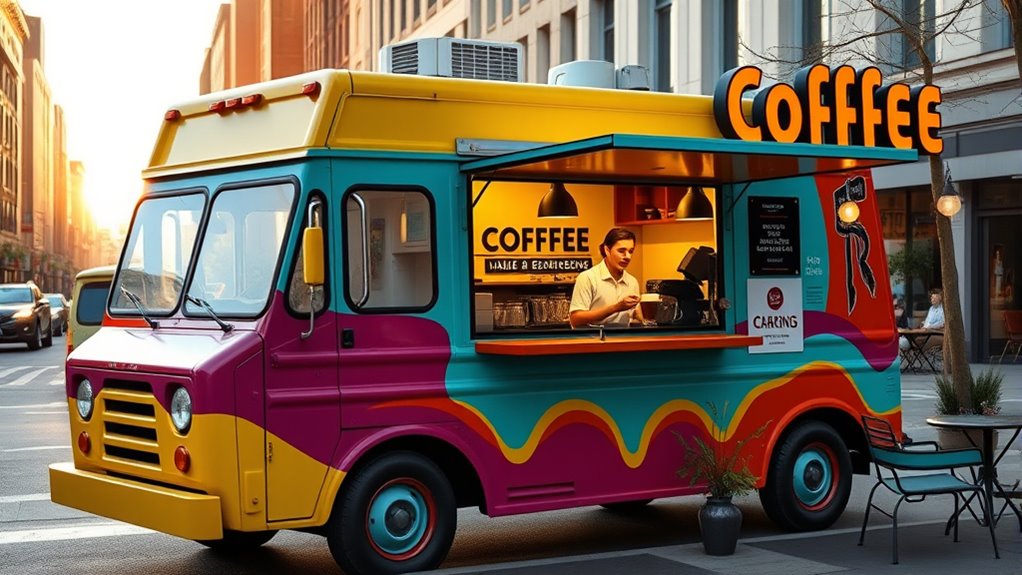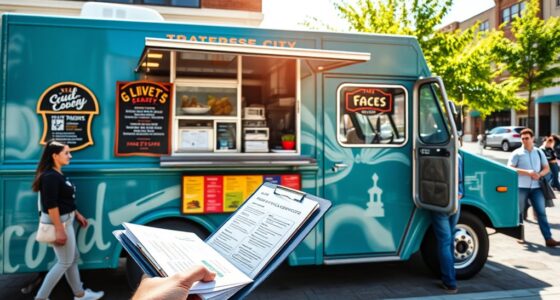Many believe starting a coffee truck is an easy way to jump into the food industry, but the reality is more complex than it seems. Success depends on careful planning, strong branding, and efficient design. If you want to turn your idea into a thriving mobile business, you need to understand each step—yet many overlook essential details that can make or break their venture. So, what’s the real path to launching a profitable coffee truck?
Key Takeaways
- Research local regulations and obtain necessary permits for operating a mobile coffee business.
- Develop a unique brand identity with effective signage and vehicle wrap design.
- Customize your coffee truck for functionality and visual appeal to attract customers and ensure smooth service.
- Invest in durable, eye-catching vehicle wraps to enhance visibility and promote your brand on the go.
- Implement a marketing strategy that highlights your specialty offerings, eco-friendly practices, and excellent customer service.

Considering starting a coffee truck business? One of the most important steps is establishing a strong brand presence that sets you apart from the competition. Your branding strategies should reflect your unique identity and appeal directly to your target audience. Think about what makes your coffee truck special—is it your specialty brews, eco-friendly practices, or exceptional customer service? Once you identify your niche, develop branding strategies that communicate these qualities clearly. This can include a memorable logo, catchy slogan, and consistent visual elements across your truck, website, and social media platforms. Branding isn’t just about aesthetics; it’s about creating an experience that customers associate with quality and reliability.
Vehicle customization plays a crucial role in this process. Your coffee truck is essentially your mobile storefront, so making it visually appealing and aligned with your brand is vital. Customizing your vehicle isn’t just about adding a logo; it’s about transforming your truck into a moving brand ambassador. Bright colors, eye-catching graphics, and creative design elements can attract attention from afar, drawing in foot traffic and increasing your visibility. Think about how your vehicle’s design can tell your story—perhaps through illustrations of coffee beans, your logo, or thematic elements that match your branding strategies. Custom vehicle wraps are a popular choice because they offer large-scale, durable advertising space that can be changed or updated as your brand evolves.
When planning your vehicle customization, consider the practicality as well. Your truck should have clearly visible signage, a well-organized layout for efficient service, and branding elements that don’t compromise functionality. The goal is to create a fundamental look that’s both attractive and functional, helping you streamline operations while fascinating potential customers. Remember, a customized vehicle isn’t just a marketing tool; it’s an extension of your brand identity. The more personalized and professional your truck looks, the more trust and recognition you’ll build among your customers.
Conclusion
Launching your coffee truck business takes effort, but with the right steps, you’re sure to hit the ground running. Focus on building a strong brand, customizing your vehicle to stand out, and connecting with your target market. Remember, a well-branded truck can be your secret weapon in a crowded market. Keep your eye on the prize, stay adaptable, and you’ll find that success is often just around the corner. Don’t forget, persistence pays off!









